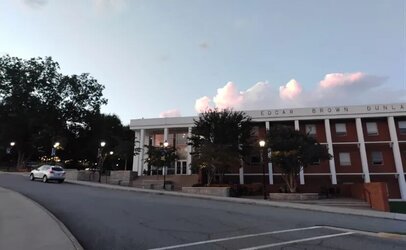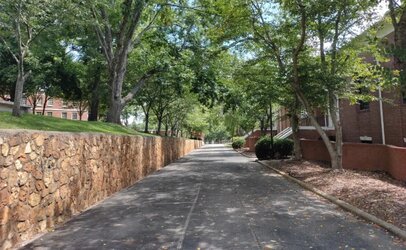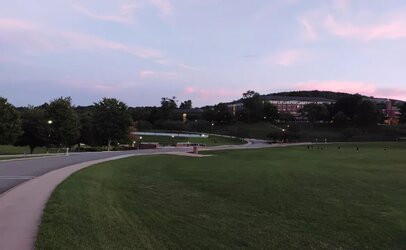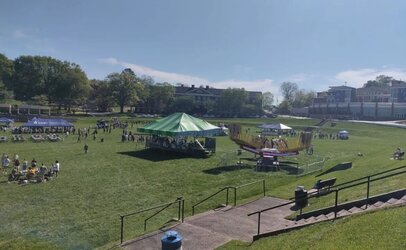L | A (Translated with ChatGPT)

The building where I usually worked while at the University of North Georgia
During my time working at the University of North Georgia, I felt that there was a strong emphasis on work-life balance, with no need for overtime or extra hours. Moreover, the program placed a high value on teamwork. Through mutual suggestions and feedback, we could enhance the quality of the teaching materials to the highest standard, avoiding potential blind spots that may arise when working alone.
The "National Language Flagship Program" in the United States is a national-level educational initiative developed through collaboration between the U.S. government and universities.
Its goal is to promote strategic language education, including Chinese, Russian, and Arabic, to cultivate bilingual and bicultural international professionals among American university students. Originally, 13 universities across the U.S. offered the Chinese Language Flagship Program, but due to budget cuts, this number has been reduced to 8.
According to information from the "U.S. National Chinese Language Flagship Program Taiwan Center" at National Chengchi University, students must complete four years of study and reach the Advanced level on the American Council on the Teaching of Foreign Languages (ACTFL) proficiency scale to apply for their final year (Capstone Year) at an overseas location. This year includes immersive language learning and internships in relevant professional fields.
During the 2022–2023 academic year, through a Ministry of Education dispatch program, I served as a Chinese language assistant at the University of North Georgia for one year. Below, I will share my firsthand experiences and observations.
Breaking Preconceived Notions About U.S. Universities
The University is located in Dahlonega, Georgia, surrounded by lush, green forests. I still remember an outing when the department chair took us to a local park, leaving me amazed by the vastness of American parks. Compared to parks in Taiwan, they feel more like national parks due to their large scale.
When I first arrived at the University of North Georgia, its rural setting and the surrounding quiet reminded me of the atmosphere in Tao Yuanming’s Peach Blossom Spring: “Following the stream, forgetting the distance of the path. Suddenly, a forest of peach blossoms appeared, stretching for hundreds of paces, with no other trees mixed in, fresh grass, and fallen petals fluttering.”
This environment brought an unexpected calm, even making me forget about America’s frequent gun issues. I had expected campus life here to be as lively and bustling as portrayed in American TV shows, but the pace at the University of North Georgia was closer to that of retirement life.

The campus atmosphere is serene and leisurely
Comprehensive Analysis of the “Chinese Language Flagship Program” Features
The University of North Georgia is considered a military school, and its "Chinese Language Flagship Program" is one of the initiatives funded by the U.S. Department of Defense. The university offers two tracks in its Chinese courses: a general curriculum and the Flagship curriculum.
The latter is more intensive; whereas the general curriculum covers one textbook per year, the Flagship curriculum typically completes one textbook per semester. Each university’s Flagship curriculum has unique features, but since the Flagship Program relies on U.S. government funding, it faces the risk of discontinuation if government support is withdrawn.
The Chinese program at the University of North Georgia is relatively well-equipped in terms of scale and teaching resources. The school has six full-time instructors, which is quite rare among overseas Chinese programs with fewer personnel. Furthermore, advanced courses such as classical Chinese and specialized Chinese (Domain Training) are offered, allowing students to gain a deeper understanding of the cultural background and professional terminology of the Chinese language.
In addition, students can register for one-on-one tutoring, and my role involves assisting with this individual instruction. This arrangement not only allows for tailored guidance based on students' personal needs but also helps enhance their listening, speaking, reading, and writing skills.

Course Design and Student Characteristics
Compared to other language programs, I believe the Chinese program at the University of North Georgia has a more comprehensive course design. For instance, the tutoring time for the Korean course is only 20 minutes and primarily focuses on grammar review. In contrast, the Chinese program offers longer tutoring sessions that cover more listening and speaking practice as well as writing guidance, allowing students more time to absorb the classroom content.
The program I participated in had about 50 students, which constitutes a significant portion of the total student population at the school. I found that the students involved in the Flagship Program are highly motivated learners, with many coming from military backgrounds. These military students have to balance military training with their academic responsibilities, resulting in considerable pressure to perform.
Based on my observations, many local students minor in Chinese while majoring in fields like international relations or biology. These students often aim to integrate their Chinese studies with their professional backgrounds to lay a foundation for their future career development.
The concept of teaching and learning mutually reinforces itself; through the long and frequent interactions I had with the students during the teaching process, I developed an interest in metacognition, prompting me to further consider how people engage in effective learning.
Taiwan Exchange and Capstone Program
Students participating in the Flagship Program also have the opportunity to engage in short-term exchanges at several universities in Taiwan, such as National Taiwan University, National Normal University, and Tamkang University. These exchange activities not only immerse American students in Taiwanese culture but also facilitate a rapid improvement in their language skills.
Notably, students at the University of North Georgia also have the opportunity to participate in the Capstone Program. They can choose to go to the Flagship Center in Taiwan (currently located at National Chengchi University) or stay in the U.S. to receive language training at the Defense Language Institute.
Students who choose Taiwan will focus on advanced language and history in the first half of the year, followed by internships that integrate their professional backgrounds in the latter half.
I believe that the exchange and collaboration between American and Taiwanese schools is highly meaningful. Encountering students in American classrooms and then meeting them again in Taiwan creates experiences that not only bridge our distances but also allow me to understand their learning and living situations from different perspectives.
Especially when I returned to Taiwan, the Flagship Program's base had just moved from National Yang Ming Chiao Tung University to my alma mater, National Chengchi University, which felt like a delightful coincidence.
Cultural Activities
In addition to regular classroom instruction, various cultural activities are organized to help students gain a deeper understanding of the culture behind the Chinese language. More significant events include celebrations for the Lunar New Year and the Mid-Autumn Festival.
Additionally, there are food-related cultural activities, such as pop-up stalls featuring Taiwanese cuisine (with varying themes each year), which are open to all faculty and students. The school also arranges outdoor retreats, allowing students to relax amidst their busy academic schedules while enhancing interaction and connections among one another.
Daily Life at the University of North Georgia

University of North Georgia
There is a small town near the university that you can explore on weekends. The town has several restaurants offering various international cuisines, but the prices are relatively high, making it less affordable for students.
If you enjoy entertainment activities, life here might seem a bit monotonous. However, the town occasionally hosts market events selling handmade crafts, which can add some fun to daily life.
Buying everyday necessities can be somewhat inconvenient since there are no convenience stores nearby. The closest Walmart (a large discount store) is about a half-hour walk away. As teaching assistants, we usually rely on students or local teachers for rides. Fortunately, the teachers and classmates here are very friendly and willing to help us with our shopping trips.
In addition, students sometimes take the Chinese teaching assistants out for fun activities, such as visiting the nearby town of Dawsonville or going to Atlanta, and even to Asian supermarkets for hot pot. These outings add a lot of enjoyment to our lives, providing opportunities to explore local culture and deepen our interactions with the students.
One day during the following semester, I was particularly impressed when the school brought amusement rides to the playground, creating a very lively atmosphere.

Amusement rides set up on the school playground
Experiences in the Work Environment
During my time working at the University of North Georgia, I felt that there is a strong emphasis on work-life balance here. There was no need for overtime work, and instances of working extra hours were uncommon. Additionally, I noticed that the local communication style is more egalitarian, requiring individuals to actively express their opinions and needs.
In contrast, the education I received in Taiwan often conditioned me to passively wait for instructions from superiors, so I needed to adjust my work habits in this regard.
Furthermore, the program places a significant emphasis on teamwork. I particularly enjoyed collaborating with a partner when designing tutoring materials, which I found very beneficial. Through mutual suggestions and feedback, we were able to enhance the quality of the materials and avoid the blind spots that can arise when working in isolation.
About the Author
Gao Weiling
Currently a graduate student at the University of Washington in Seattle, Gao Weiling is also a Chinese language teacher. Passionate about learning and deeply interested in metacognition (thinking about how we think and learning how we learn), she hopes that everyone can find their own path to growth and enjoy the process of learning. She believes that learning environments are not limited to classrooms; the world itself is like a classroom. Engaging with people from diverse cultures and backgrounds often inspires and provides new insights.

The building where I usually worked while at the University of North Georgia
During my time working at the University of North Georgia, I felt that there was a strong emphasis on work-life balance, with no need for overtime or extra hours. Moreover, the program placed a high value on teamwork. Through mutual suggestions and feedback, we could enhance the quality of the teaching materials to the highest standard, avoiding potential blind spots that may arise when working alone.
The "National Language Flagship Program" in the United States is a national-level educational initiative developed through collaboration between the U.S. government and universities.
Its goal is to promote strategic language education, including Chinese, Russian, and Arabic, to cultivate bilingual and bicultural international professionals among American university students. Originally, 13 universities across the U.S. offered the Chinese Language Flagship Program, but due to budget cuts, this number has been reduced to 8.
According to information from the "U.S. National Chinese Language Flagship Program Taiwan Center" at National Chengchi University, students must complete four years of study and reach the Advanced level on the American Council on the Teaching of Foreign Languages (ACTFL) proficiency scale to apply for their final year (Capstone Year) at an overseas location. This year includes immersive language learning and internships in relevant professional fields.
During the 2022–2023 academic year, through a Ministry of Education dispatch program, I served as a Chinese language assistant at the University of North Georgia for one year. Below, I will share my firsthand experiences and observations.
Breaking Preconceived Notions About U.S. Universities
The University is located in Dahlonega, Georgia, surrounded by lush, green forests. I still remember an outing when the department chair took us to a local park, leaving me amazed by the vastness of American parks. Compared to parks in Taiwan, they feel more like national parks due to their large scale.
When I first arrived at the University of North Georgia, its rural setting and the surrounding quiet reminded me of the atmosphere in Tao Yuanming’s Peach Blossom Spring: “Following the stream, forgetting the distance of the path. Suddenly, a forest of peach blossoms appeared, stretching for hundreds of paces, with no other trees mixed in, fresh grass, and fallen petals fluttering.”
This environment brought an unexpected calm, even making me forget about America’s frequent gun issues. I had expected campus life here to be as lively and bustling as portrayed in American TV shows, but the pace at the University of North Georgia was closer to that of retirement life.

The campus atmosphere is serene and leisurely
Comprehensive Analysis of the “Chinese Language Flagship Program” Features
The University of North Georgia is considered a military school, and its "Chinese Language Flagship Program" is one of the initiatives funded by the U.S. Department of Defense. The university offers two tracks in its Chinese courses: a general curriculum and the Flagship curriculum.
The latter is more intensive; whereas the general curriculum covers one textbook per year, the Flagship curriculum typically completes one textbook per semester. Each university’s Flagship curriculum has unique features, but since the Flagship Program relies on U.S. government funding, it faces the risk of discontinuation if government support is withdrawn.
The Chinese program at the University of North Georgia is relatively well-equipped in terms of scale and teaching resources. The school has six full-time instructors, which is quite rare among overseas Chinese programs with fewer personnel. Furthermore, advanced courses such as classical Chinese and specialized Chinese (Domain Training) are offered, allowing students to gain a deeper understanding of the cultural background and professional terminology of the Chinese language.
In addition, students can register for one-on-one tutoring, and my role involves assisting with this individual instruction. This arrangement not only allows for tailored guidance based on students' personal needs but also helps enhance their listening, speaking, reading, and writing skills.

Course Design and Student Characteristics
Compared to other language programs, I believe the Chinese program at the University of North Georgia has a more comprehensive course design. For instance, the tutoring time for the Korean course is only 20 minutes and primarily focuses on grammar review. In contrast, the Chinese program offers longer tutoring sessions that cover more listening and speaking practice as well as writing guidance, allowing students more time to absorb the classroom content.
The program I participated in had about 50 students, which constitutes a significant portion of the total student population at the school. I found that the students involved in the Flagship Program are highly motivated learners, with many coming from military backgrounds. These military students have to balance military training with their academic responsibilities, resulting in considerable pressure to perform.
Based on my observations, many local students minor in Chinese while majoring in fields like international relations or biology. These students often aim to integrate their Chinese studies with their professional backgrounds to lay a foundation for their future career development.
The concept of teaching and learning mutually reinforces itself; through the long and frequent interactions I had with the students during the teaching process, I developed an interest in metacognition, prompting me to further consider how people engage in effective learning.
Taiwan Exchange and Capstone Program
Students participating in the Flagship Program also have the opportunity to engage in short-term exchanges at several universities in Taiwan, such as National Taiwan University, National Normal University, and Tamkang University. These exchange activities not only immerse American students in Taiwanese culture but also facilitate a rapid improvement in their language skills.
Notably, students at the University of North Georgia also have the opportunity to participate in the Capstone Program. They can choose to go to the Flagship Center in Taiwan (currently located at National Chengchi University) or stay in the U.S. to receive language training at the Defense Language Institute.
Students who choose Taiwan will focus on advanced language and history in the first half of the year, followed by internships that integrate their professional backgrounds in the latter half.
I believe that the exchange and collaboration between American and Taiwanese schools is highly meaningful. Encountering students in American classrooms and then meeting them again in Taiwan creates experiences that not only bridge our distances but also allow me to understand their learning and living situations from different perspectives.
Especially when I returned to Taiwan, the Flagship Program's base had just moved from National Yang Ming Chiao Tung University to my alma mater, National Chengchi University, which felt like a delightful coincidence.
Cultural Activities
In addition to regular classroom instruction, various cultural activities are organized to help students gain a deeper understanding of the culture behind the Chinese language. More significant events include celebrations for the Lunar New Year and the Mid-Autumn Festival.
Additionally, there are food-related cultural activities, such as pop-up stalls featuring Taiwanese cuisine (with varying themes each year), which are open to all faculty and students. The school also arranges outdoor retreats, allowing students to relax amidst their busy academic schedules while enhancing interaction and connections among one another.
Daily Life at the University of North Georgia

University of North Georgia
There is a small town near the university that you can explore on weekends. The town has several restaurants offering various international cuisines, but the prices are relatively high, making it less affordable for students.
If you enjoy entertainment activities, life here might seem a bit monotonous. However, the town occasionally hosts market events selling handmade crafts, which can add some fun to daily life.
Buying everyday necessities can be somewhat inconvenient since there are no convenience stores nearby. The closest Walmart (a large discount store) is about a half-hour walk away. As teaching assistants, we usually rely on students or local teachers for rides. Fortunately, the teachers and classmates here are very friendly and willing to help us with our shopping trips.
In addition, students sometimes take the Chinese teaching assistants out for fun activities, such as visiting the nearby town of Dawsonville or going to Atlanta, and even to Asian supermarkets for hot pot. These outings add a lot of enjoyment to our lives, providing opportunities to explore local culture and deepen our interactions with the students.
One day during the following semester, I was particularly impressed when the school brought amusement rides to the playground, creating a very lively atmosphere.

Amusement rides set up on the school playground
Experiences in the Work Environment
During my time working at the University of North Georgia, I felt that there is a strong emphasis on work-life balance here. There was no need for overtime work, and instances of working extra hours were uncommon. Additionally, I noticed that the local communication style is more egalitarian, requiring individuals to actively express their opinions and needs.
In contrast, the education I received in Taiwan often conditioned me to passively wait for instructions from superiors, so I needed to adjust my work habits in this regard.
Furthermore, the program places a significant emphasis on teamwork. I particularly enjoyed collaborating with a partner when designing tutoring materials, which I found very beneficial. Through mutual suggestions and feedback, we were able to enhance the quality of the materials and avoid the blind spots that can arise when working in isolation.
About the Author
Gao Weiling
Currently a graduate student at the University of Washington in Seattle, Gao Weiling is also a Chinese language teacher. Passionate about learning and deeply interested in metacognition (thinking about how we think and learning how we learn), she hopes that everyone can find their own path to growth and enjoy the process of learning. She believes that learning environments are not limited to classrooms; the world itself is like a classroom. Engaging with people from diverse cultures and backgrounds often inspires and provides new insights.